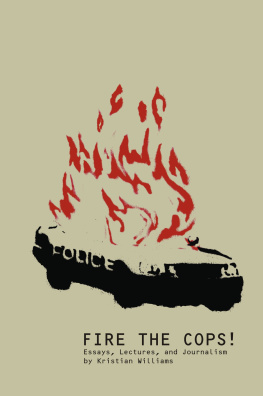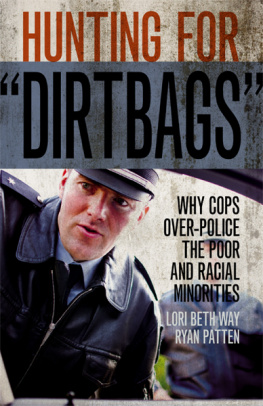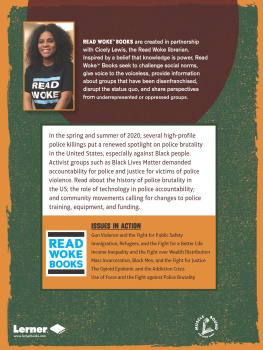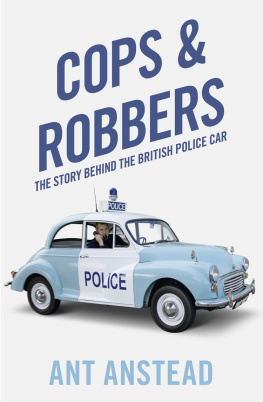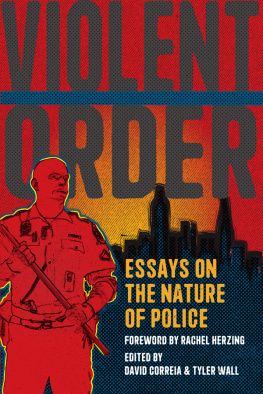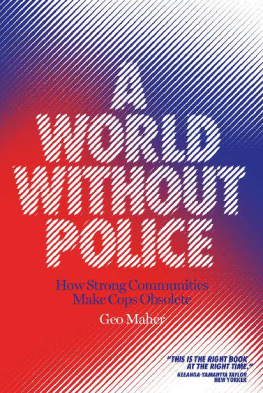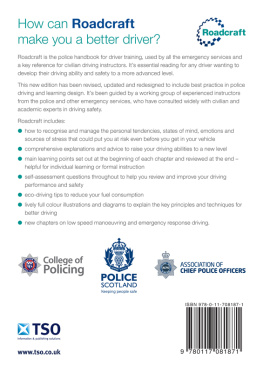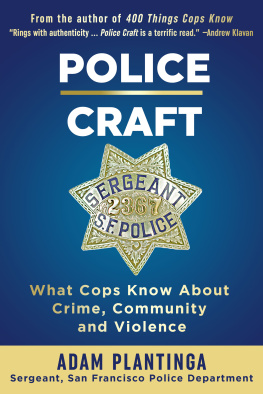Fire the Cops!, by Kristian Williams
ISBN: 978-1-894946-67-4
Copyright 2014 Kristian Williams
This edition copyright 2014 Kersplebedeb
first digital edition 2014
Kersplebedeb Publishing and Distribution
CP 63560 CCCP Van Horne
Montreal, Quebec
Canada H3W 3H8
email:
web: www.kersplebedeb.com
www.leftwingbooks.net
The cover image is a design by Kersplebedeb based on a photo by Denna Jones of graffiti at Dalston Junction, London, relating to the 2005 revolt of the Paris suburbs. Photo from flickr, creative commons by 2.0.
Please note that web addresses in Fire the Cops! were accessed at the time each essay was originally being written. They may have changed since, or may simply no longer be available on the internet. They have not been updated for inclusion in this book. Hyperlinks which were found to have expired at the time that this digital edition was being prepared have been preserved but deactivated, and indicated as expired.
Introduction
Our Enemies in Blue : A Short Retrospective
I have been writing about the police for most of my adult life. My interest in the subject is not what is called academicmeaning: dispassionate, disinterested, abstract, removed. To adopt such an attitude toward injustice is almost the definition of cynicism, for it assumes that one cannot be invested and also be honest. It suggests that no one who cares about freedom or equality can possibly be trusted, though how one might trust people who do not care about such things remains something of a mystery. So let me say, at the outset, that I am not impartial or indifferent. I am a partisan in this fight, and my thinking with regards to the police grows directly out of my experience with them.
Active Resistance
I dont know how many people can look back on their lives and see a single, defining turning pointa moment where their lives were irreversibly put on one track instead of another; or rather, on one track rather than any other. A moment in which only one course of action became possible, and all others were excluded.
That moment came for me in 1996, in Chicago. The Democratic National Convention was being held there for the first time since the disaster of 1968, when police were shown on live television viciously beating protestors, reporters, bystandersanyone within a batons reach.
Demonstrations were inevitable and, in my thinking, largely pointless. What was more interesting was an invitation I had received months earlier to attend Active Resistance, an anarchist counter-convention with workshops, discussion groups, a radical bus tour, and seminars on understanding the economy, the media, and so on. I was just out of college, volunteering with 223 (the anarchist book shop in Portland, Oregon), cooking for Food Not Bombs, and petitioning for a ballot initiative to raise the minimum wage. But I was beginning to wonder about how such activities were supposed to add up to a movement, much less a revolution. I didnt realize it, but I was searching for some direction, some purpose. And I found it at the hands of the Chicago police.
Near the end of the conference, some of the participants of Active Resistance had organized a march to go, not toward the DNC, appealing to the delegates, but into the Wicker Park neighborhood, directly addressing the public. The idea was to communicate both the fact that resistance to capitalism already existed and to symbolically represent something of our vision for a better world. Dubbed the Festival of the Oppressed, the march prominently featured giant puppets and drums. Really, it was just an innocent little neighborhood parade, albeit one with an anarchist message.
The police attacked. They charged with horses, moved in with clubs. They pulled people off the streets and threw them into paddy wagons. Later that night, they raided one of the Active Resistance meeting spaces, freely spraying mace, hitting people with batons, and knocking them to the floor.
I was, I think, the first casualty. I had been standing in the street, waiting for the parade to move, when a nearby cop lost control of his horse. The horse skipped sideways a few steps, knocking me over and crushing my foot. The cops looked on, unmoved, and one of the demonstration organizers scooped me up and carried me to the relative safety of the sidewalk.
There was a short discussion about what to do with me. I couldnt walk, and I needed to go to the Emergency Room. So when a van of hippies stopped and offered me a ride, I gladly accepted. I got into the van, along with Missy, my girlfriend at the time. The hippies, two men and a woman, were members of the anti-nuclear Shundahai network; they were in Chicago as part of a nationwide tour to raise awareness about the despoiling of Shoshone land. Behind the van they towed a mock radioactive waste cask.
The van crawled along at the rear of the parade, and our hosts gave me some ice for my foot. I was nearly delirious from pain, and I didnt quite realize what was happening when a traffic cop stepped in front of the van and waved us over to the curb. As soon as we were stopped, the van was surrounded by police. They opened the sliding door and immediately struck me on the shins with a nightstick. They grabbed me by the shoulders and hair, and threw me to the pavement. The others were also pulled out, and lined up by a wall nearby. Eventually two cops grabbed me under the arms and half-walked, half-dragged me to a paddy wagon. One of them told me, with a serious voice, that I scream like a girl. And one cop, Michael Shemash, set me down in the paddy wagon, and then proceeded to stomp repeatedly on my injured foot.
By the time we got to the station I was blacking out from pain. After booking, they separated me form the others, putting me in a tiny interview room with a bench and a desk. Soon the room was filled with cops, asking me questions. They said they needed to complete a form before I could be transferred to a hospital, but their inquiries quickly moved away from name/address/birthdate, toward questions about who organized the conference, and whether there were any drugs in the van. I stopped talking, and eventually the cops left me alone. I lay down on the bench and passed out.
I spent that night shivering in a jail cell, hardly sleeping.
For the following year, I repeatedly traveled back and forth, to and from Chicago, meeting with lawyers, sitting in court, fighting the charges: disorderly conduct, obstructing a peace officer, and battery. The others in the van faced similar accusations. When we finally made it to trial, the cops story was a mess. They contradicted each other repeatedly, and some of them even contradicted themselves. (One officer testified that I was, simultaneously, in the passenger seat by the driver and in the back of the van by the rear door.) In the end, we were acquitted of all charges. We learned later that the judge had himself been a cop during the 1968 Democratic Convention.
Lawsuits followed. Those of us from the van incident sued over our treatment, and in 1999 reached a settlement. Meanwhile, the organizers of Active Resistance sued over the surveillance that was evident throughout the conference and the raid at the end.
The cops had been under what is called a consent decree since the early 80s. Based on their violations of Constitutional rights in the 70s, they had been sued and reached an agreement limiting their intelligence operations. Similar measures were put in place in cities throughout the country, part of the society-wide housecleaning after Watergate. In Chicago, the cops had violated that agreement repeatedly, and Richard Gutman, a movement lawyer, had made his career suing to enforce the ruleswith varying degrees of success. He took on the Active Resistance case, and, at the same time, the City of Chicago petitioned to have the consent decree lifted altogether. They argued that such abuses were a relic of Cold War hysteria, so the restrictions were no longer necessary; at the same time, and with no shame at the contradiction, they also argued that in the new context of counter-terrorism, the restrictions were an impediment to necessary police work. In early 2001, the court sided with the City. Soon, consent decrees were being scrapped across the countryshowing that the present period of repression, though clearly intensified by the events of September Eleventh, actually began a bit earlier.
Next page
